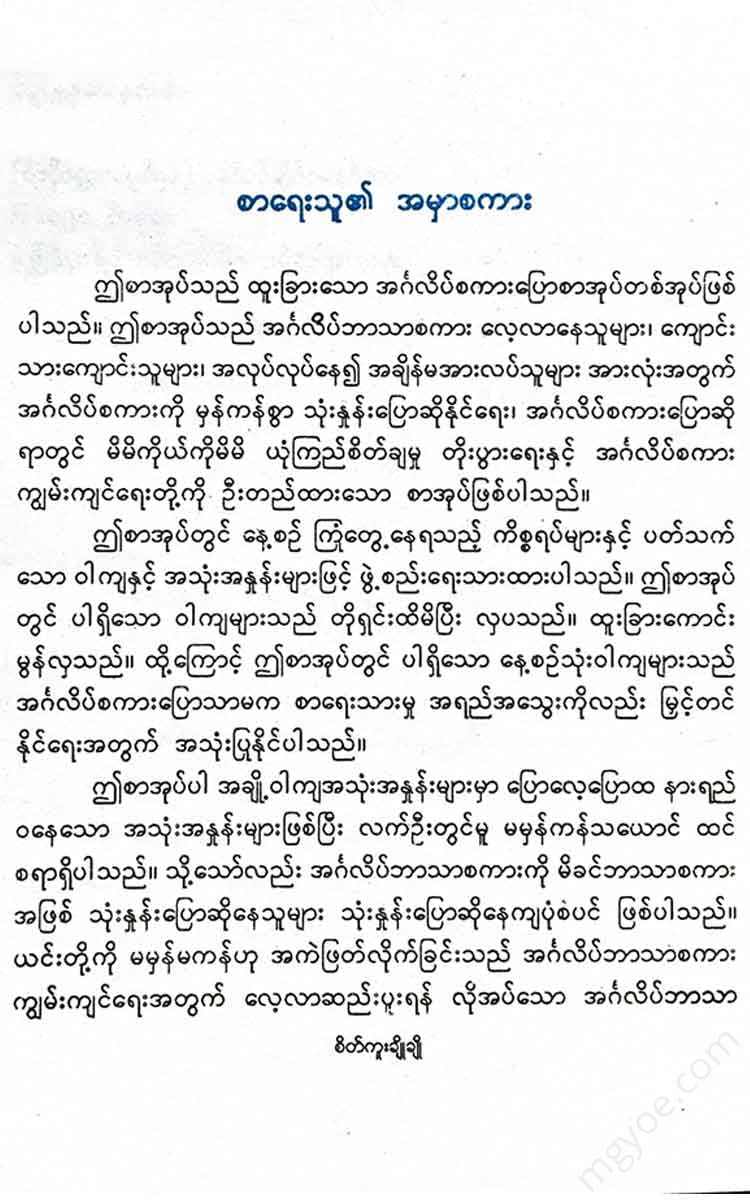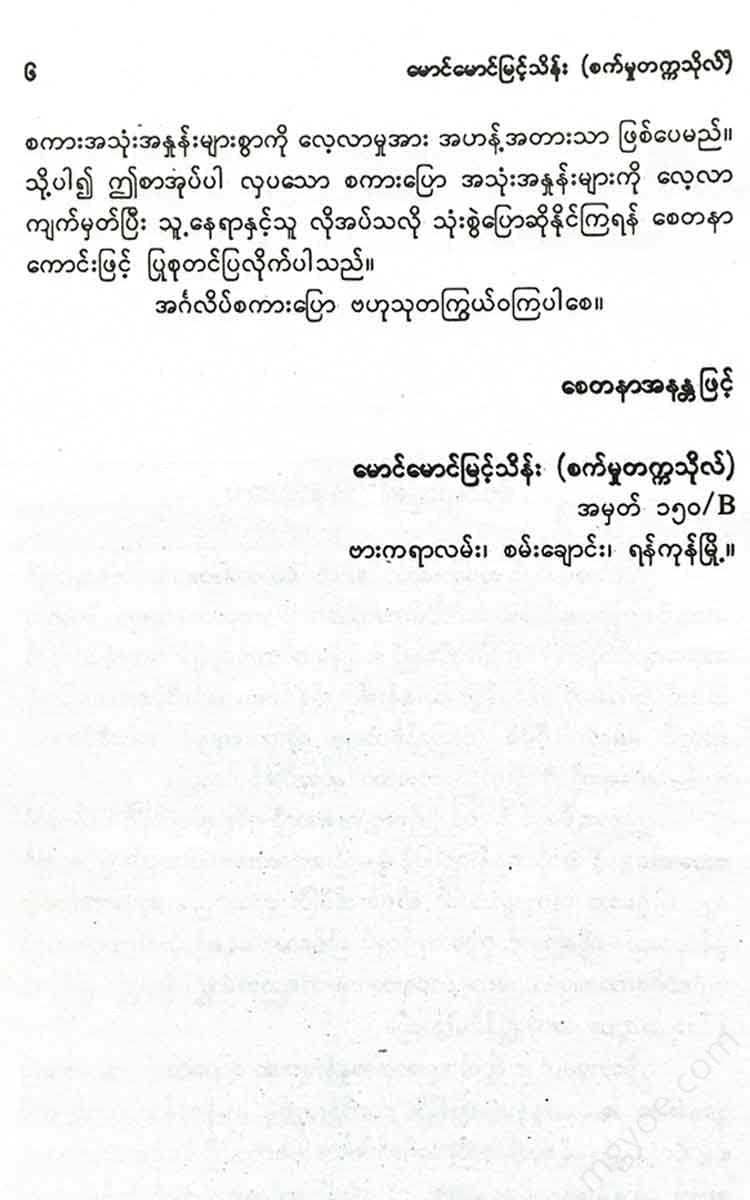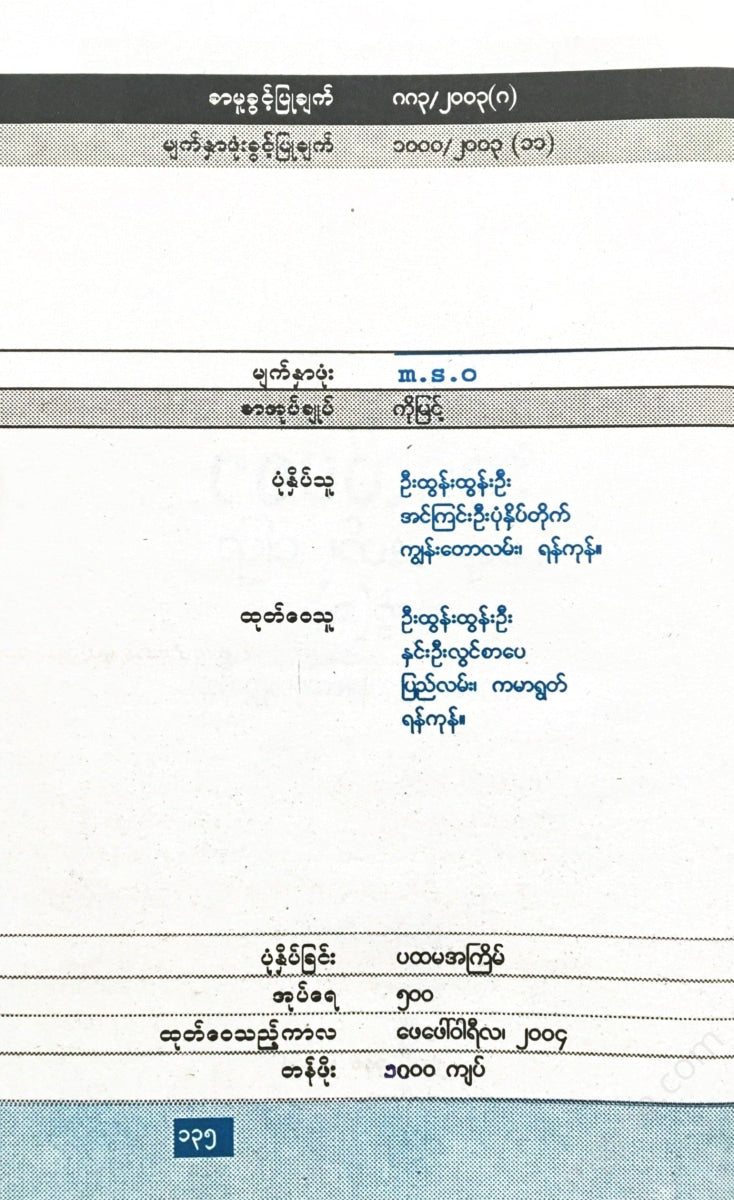စိတ်ကူးချိုချိုစာပေ
Maung Maung Myint Thein (University of Technology) - English Writing, Reading and Speaking Volume (1)
Maung Maung Myint Thein (University of Technology) - English Writing, Reading and Speaking Volume (1)
Couldn't load pickup availability
- We abandoned all hope (ie no longer had any hope.)
We have given up all hope. (In other words, there was no hope at all.)
- I can't abide that man. (ie bear, endure him)
I can't stand that person.
( Instead of abide, you can use bear, endure him)
- You'll have to abide by the consequences. (ie endure them.)
You should act according to the situation. (In other words, you should tolerate them.)
- We do not doubt your ability to do the work.
We have no doubt about your work ability.
- He is a man of great abilities.
He is a man of many talents.
- He took up his abode with his brother. (ie Went to live with him.)
He is going with his brother.
(He went to live with him can also be used)
- His plans proved abortive (ie unsuccessful)
His plans failed. (In other words, they failed.)
- She is careless about her personal appearance.
She doesn't care about getting ready.
- It's the wrong way about. (ie in the opposite direction.)
That's the wrong way. (In other words, it's the opposite situation.)
- He is a man with an abrupt manner. (ie rather polite)
He is a man of blunt manners. (In other words, he has a somewhat rude and uncivilized appearance.)
- We cannot act in the absence of definite information.
We can't do it without accurate information.
( If you don't tell me exactly what to do, I don't know how to do it.)
- An absolute promise must be kept whatever happens.
An absolute promise must be kept, no matter what.
- His business absorbs him. (ie takes up his attention.)
His work has absorbed him. (In other words, it has captured his attention.)
- He lives in abundance. (ie has plenty of those things that make life enjoyable.)
He is wealthy (rich). (In other words, he has many things that make life enjoyable.)
- There is abundant proof of his guilt.
There is overwhelming evidence that he is guilty.
- Don't abuse the confidence we have placed in you.
(ie make a bad or wrong use of.) Don't abuse the trust we have in you.
( Please do not use it in any way that is bad or incorrect.)
- She used abusive language to him.
She used harsh words.
- The proposal met with general acceptance.
The proposal (presentation) was generally accepted by most.
- I will accommodate my plans to yours. (ie change them so that they fit in with yours.) I will accommodate my plans to yours. (ie change them so that they fit in with yours.)
- She was accorded a warm welcome.
She was warmly welcomed.
- His behavior does not agree with his principles.
His behavior is not consistent with his ideology. (In other words, his words and his actions are not consistent.)
- You will be judged according to whether your work is good or bad.
You will be judged based on whether you do a good (or bad) job.
- Please put the goods down to my account.
Please add these items to my account.
- He won't acknowledge himself beaten. (ie that he has been defeated.)
He himself does not accept that he has been defeated. (In other words, he does not accept that he has been defeated.)
- She would not acknowledge her mistake.
She doesn't acknowledge her mistake.
- He has a wide circle of acquaintances.
He has many friends and acquaintances.
- She will be a valuable acquisition to the staff of our firm. She will be a valuable asset to our business organization.
- Don't act the fool. (ass, idiot), (ie behave foolishly)
Don't be silly. (In other words, don't be foolish.)
- We shall judge by your actions, hot by your promises.
You will be judged by your actions and behaviors, not by your promises.
- Don't be so impulsive in your actions.
Don't be so self-conscious about your actions.
- What is the actual position of affairs?
What is the real state of affairs?
- She was actuated by the best of intentions.
She was motivated by the best of intentions.
- He felt acute remorse for his wrongdoing.
He deeply regretted his wrongdoing.
- You must admit the task to be difficult. (ie that it is difficult) You must admit the task to be difficult. (ie that it is difficult)
- The words admit of no other meaning.
These words have no other meaning.
- May I advance my opinion on the matter?
Can I express my opinion on this matter?
- He always takes full advantage of the mistakes made by his rivals. He always takes full advantage of the mistakes made by his rivals.
- A brave man smiles in the face of adversity.
A courageous person faces opposition with a smile.
- Who is the best man to advise me on the question?
Who is the best person to advise me on this matter?
- That's my business, not yours.
That's my business, not yours.
- Mind your own business.
Take care of your own business. (Take care of your own business)
- He affected not to hear me. (ie pretended)
He pretended not to hear me. (In other words, pretended instead of affected means pretended.)
- Her little affections annoyed us. (ie unnatural behavior)









